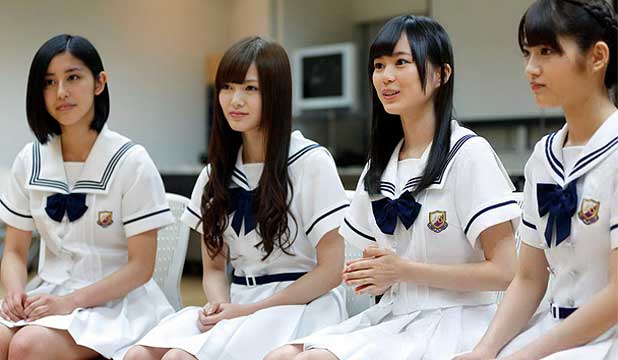
Ritsuhiko Tajima has about 100 CDs by his favourite artist, Japanese girl-group AKB48, many of them copies of the same disk. The attraction The CDs often include tickets to events where he can briefly meet his idols.
“I don’t think I’ll ever get tired of them,” the 28-year- old nursing assistant said as he waited in line at the group’s Tokyo theatre for a monthly sale of limited-edition photos of its members. “They’re pop stars I can come visit.”
Fans like Tajima helped consumer music revenue in Japan grow 3 per cent last year to US$4.3 billion (NZ$5.5billion), topping the United States to become the world’s largest market, according to the Recording Industry Association of Japan.
Music sales in the country rose for the first time in five years, led by tunes delivered on CDs and other physical media, bucking the trend in developed markets as cheaper downloads gain ground. Physical media made up 82 percent of Japanese music sales last year, versus 37 percent in the U.S., the recording industry group says.
Much of Japan’s strength can be attributed to acts like AKB48, which has boosted sales of music in physical formats through innovative marketing such as CDs packaged with tickets to the handshake events and ballots that let fans vote online for their favourite singers.
AKB48’s miniskirted members perform in three groups of about 20 each at the 250-seat theatre. Formed in 2005, AKB48 is the nation’s top-selling girl band, spawning three sister acts in Japan and two abroad. Sony Corp., which has the second- largest share of Japan’s music market, started a rival group called Nogizaka 46 last year to compete with AKB48, a Sony artist before leaving in 2008 for closely held King Record Co.
“Sony Music is betting its future to grow this idol group,” Yasushi Akimoto, the lyricist and producer for Nogizaka 46 – and producer of AKB48 – says on the Nogizaka website.
Behind the success of Japan’s girl groups is “a drastic change in the relationship with fans by involving them in the star-making process,” said Hideki Take, a music commentator and disc jockey in Tokyo. After being chosen in amateur auditions, prospective new group members perform in small theatres where fans vote on which members will be featured.
“Unlike most stars selected by executives at recording companies, it’s a fan-centred system,” Take said. “The fans feel they are part of the success.”
AKB48’s singing and dancing teens are divided into three teams – A, K and B – that rotate performances every evening in a theatre above a discount store in Tokyo’s Akihabara district.
Several times a year, they also hold events where tens of thousands of followers gather at convention halls across Japan for a chance to briefly meet their girl-band idols.
Nogizaka 46 is following a similar script, part of an effort by Sony to shore up domestic sales that have fallen in spite of the industry’s strength. Sony says its Japan music sales dropped to 167 billion yen in the year ended March from 174 billion yen a year earlier.
Ad Feedback
That decline helped bump Sony from the lead in Japanese music sales. The company had a 14.4 percent share of the country’s music market last year, 0.5 points behind Avex Group Holdings Inc., according to researcher Oricon Inc. Sony’s troubles in entertainment have prompted investor Daniel Loeb to propose selling as much as 20 percent of its music and movie business.
Analysts say the strength of Japan’s music market could be short-lived. Sales of CDs and other physical media to consumers dropped 6 percent in the first five months of 2013 from a year earlier, according to the recording industry association.
And the US still accounts for more total music-related revenue when including subscription and streaming service fees and licensing for films and ads.
“We may appear to be in better shape than other markets, but music companies here aren’t feeling optimistic,” said Yusuke Nakagawa, president of Asobisystem Co., a talent agency.
The challenge for Japan’s music industry is creating similarly intense fan loyalty outside Japan, said Damian Thong, an analyst at Macquarie Group Ltd. in Tokyo. AKB48’s backers have launched groups in Shanghai (SNH48) and Jakarta (JKT48) to extend the franchise.
“AKB48’s innovation was not, in a sense, making new music, but in creating a new kind of immediacy and new kind of connection to the fan base,” Thong said.
Nogizaka 46 still has a long way to go before catching AKB48. Sony’s group sold 303,474 CD singles of its biggest hit, “Seifuku no Mannequin,” or “Mannequin in Uniform,” in the first half of this year. That was dwarfed by AKB48’s “Sayonara Crawl,” the No. 1 release, which sold 1.9 million copies.
Sony auditioned 38,934 girls to select 33 members for the group. The company is adding 13 new members this year after a second round of auditions in May. Among the members fans can meet is 16-year-old Erika Ikuta, a front-line performer who says she enjoys shaking thousands of hands a day.
“At these events, I learn my fans are paying so much more attention to me than I could ever imagine,” Ikuta said before the group’s dance practice at Sony Music’s Japan headquarters. “It gives me a supportive push.”
Fans like Yuka Kimura love it, too. Kimura travelled more than an hour from Tokyo for an AKB48 handshake event in Chiba prefecture with 10 tickets, which she got by purchasing 10 identical CDs at 1000 yen each. Those allowed her to line up multiple times to meet her favorite singers – though each encounter lasts less than five seconds and no photos or autographs are allowed.
“It’s worth paying the price,” Kimura said. “Even just for a few seconds, I get to meet my favourite member, and that’s fun.”
– With assistance from Masahiro Watanabe, Naoko Fujimura and Kyoji Iwai in Tokyo.